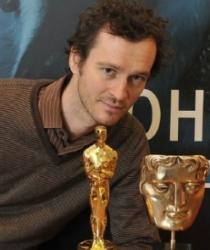
From the moment he arrived in 1987, Bedales seemed to be a perfect fit for Sirio Quintavalle. “I had a pretty good time from the word go,” he recalls. “It was difficult not to have fun at a place which allowed you freedom to follow your interests. I guess that I was quite shy in the early days, but that soon disappeared. Most public schools seem to have their share of confident and charming pupils, but what made Bedales different was the absence of boundaries between generations. No uniforms and the informality that existed between our teachers and us made me feel that I could talk to anyone as an equal.”
Sirio loved the art and craft ethos at Bedales, whether it was working on a loom, baking bread, or attempting a perfect dovetail joint. He also excelled in maths and science. “I was part of an impressive maths and sciences set at school, and a lot of us went on to Oxbridge,” he says. “The quality of teaching was very high, and I was lucky to have Dennis Archer and Tobias Hardy, who had only just joined. Together they made an incredible combination. I only now realise how rare it is to have such a range of excellent teachers.”
Sirio was also voted head boy in his final year at Bedales. “It was the result of a pupil vote, so it was a nice affirmation from your peers.” Becoming head boy had a great impact on Sirio’s confidence and helped him to be a better public speaker. Any early nerves in assemblies soon faded, and he started to enjoy every minute of it.
Physics at Oxford was a fairly easy transition. “It was not dissimilar to Bedales,” Sirio explains, “in that the tutorial system encouraged you to be curious to learn for yourself and through your own efforts, rather than being spoon-fed.”
Like many people, Sirio was initially unsure what to do after university. He first taught physics at St. Paul’s Girls’ School and thoroughly enjoyed the competitive environment, but felt he needed to work outside of education, at least for a while. After reading an article in his college magazine, Sirio met up with Tim Webber, who was a director at Framestore in Soho. “I wrote to him, and asked how, as a fellow Physics graduate, he had got started in the Effects industry. A few weeks later, I was working there as a trainee FX artist. I was lucky.”
It was outstandingly good timing. Tim Webber was a leading light of the British visual effects company, Framestore, and one of those who were revolutionising the art form. Webber had just won an Emmy for his work on Gulliver’s Travels and Sirio joined Framestore at a point when British cinema was about to prove that it was a force on more than quirky, low-budget movies. “The Harry Potter films were probably the turning point,” Sirio suggests. “It showed that we could do the high budget movies with great success and was a massive boost for the UK industry. All of a sudden, we were taken seriously by Hollywood. There is no doubt that visual effects have been going through something of a golden period recently.”
From working as a digital effects artist on the TV documentary “Walking With Dinosaurs”, and as a compositor on the Potter franchise and movies such asMamma Mia!, Sirio graduated to become visual effects artist on Clash of the Titans, compositing supervisor on “Where the Wild Things Are” and “War Horse”and visual effects supervisor for “Tinker Tailor Solder Spy” and “Sherlock Holmes 2: A Game of Shadows”. However, glamorous as travelling around the world for the best part of fifteen years in search of the perfect waterfall or the ideal stage might sound, it was now taking a toll on Sirio’s personal life. By the time Framestore had amazed the visual effects industry and been garlanded with Oscars for its pioneering work on Gravity, he had left the company.
“It was a lifestyle choice,” Sirio reveals. “It really hit me when I was away on location somewhere and the kids were calling me after they’d been skiing in St Moritz. I had spent years not taking holiday and missing my family. I wondered what I was doing and realised that I needed to be closer to home.” Still young and full of enthusiasm, Sirio returned to teaching physics, this time at Wellington College in Berkshire.
“There are some interesting differences between the schools at which I’ve taught and the one where I was educated,” Sirio observes. “The quality of teaching is impressive at all of them, but Bedales did not tend to place the absolute emphasis on A grades to the same extent as the other two. Wellington is obviously shaped by its military ethos and sporting tradition, and here everyone takes on many non-academic pursuits as well. In my case that means hockey, football and CCF. Sport at Bedales wasn't the most competitive, but I've had to adapt quickly to coaching in a highly competitive sporting environment. Strangely, perhaps, I’m loving it. Training in the classroom and on the sports field both seem to help each other.”
Wellington has thrived under the current headmaster, Anthony Seldon, who is widely thought to have reinvigorated the school. “It’s definitely a great place to work, full of energy” says Sirio. “I am determined to keep challenging myself. On one level I've returned to school, but on another it is a completely new adventure. In some respects, being a Bedalian always stays with you, perhaps now more than ever.”
Sirio Quintavalle was interviewed by James Fairweather in March 2014.
